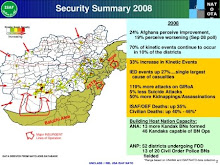Georg Wilhelm Friedrich Hegel (1770-1831): THE HEGELIAN DIALECTIC
The dialectical process toward the Absolute Idea can be visualized as follows:
Hegel maintains that the juxtaposition and violent interaction of binary oppositions will continue until a position is reached which is so perfectly balanced that no new antithesis can arise, because there are no extremes left to form a thesis. This bland-sounding paradise is what Hegel calls THE ABSOLUTE IDEA, and history is the process of human civilization working toward this end point, motivated by a spiritual force which Hegel calls the WORLD-SPIRIT or WORLD-MIND. Because the ultimate cause of progress in Hegel's view of history is an abstract force, we call his philosophy a form of idealism (there are many philosophical ideas which merit this description).
Karl Marx later accepts Hegel's idea of the dialectical process as the mainspring of inevitable human progress, but he rejects Hegel's explanation that all this is due to some abstract force seeking perfection. In response, Marx develops an idea we call dialectical materialism . . .
MARX'S DIALECTICAL MATERIALISM
Marx's view of history is called dialectical materialism because he sees the dialectical process being driven forward not by abstract forces, as Hegel did, but rather by solid material conditions, and particularly by economic factors. In other words, while Hegel's description of history rests on the idea that new ideas cause us to change the way we live (our thoughts change, and the world changes in response), Marx's description states that when new economic relationships change the way we live, we develop new ideas (the world changes, and our thoughts change in response).
An example of Marx's idea of the dialectic can be shown as follows:
BULLSCRAPS, 2BIG 2FAIL , GANG-BANKSTERS T-Shirt
15 years ago



No comments:
Post a Comment